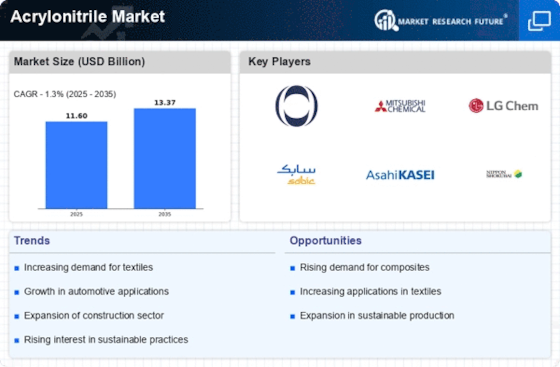Top Industry Leaders in the Acrylonitrile Market
 Acrylonitrile, a versatile organic compound, plays a crucial role in various industries. Its market, though experiencing steady growth, is marked by intense competition. Let's delve into the competitive landscape, exploring key players, strategies, and recent developments.
Acrylonitrile, a versatile organic compound, plays a crucial role in various industries. Its market, though experiencing steady growth, is marked by intense competition. Let's delve into the competitive landscape, exploring key players, strategies, and recent developments.
Market Leaders and Strategies:
-
INEOS: The undisputed leader, INEOS boasts a global network and strong presence in Europe and North America. Their strategy hinges on operational excellence, cost optimization, and expanding into emerging markets. -
China Petroleum & Chemical Corporation (CPCC): A dominant force in Asia, CPCC leverages its vast domestic market and vertically integrated production chain. They are actively investing in capacity expansion and technological advancements. -
Asahi Kasei Corporation: A leading Japanese player, Asahi Kasei focuses on high-value niche segments and boasts a strong R&D pipeline. They emphasize product differentiation and sustainability initiatives. -
Ascend Performance Materials: A prominent American player, Ascend excels in operational efficiency and caters to diverse customer needs. They actively pursue acquisitions and partnerships to strengthen their market position. -
AnQore: A Belgian chemical giant, AnQore emphasizes operational flexibility and caters to specific regional demands. They are actively involved in mergers and acquisitions to expand their reach.
Factors Shaping Market Share:
-
Production Capacity and Cost Leadership: Major players with large production capacities and efficient processes enjoy cost advantages, attracting customers. -
Geographical Presence and Market Penetration: Strong presence in key regions, particularly Asia, and established distribution networks are crucial for market share dominance. -
Product Diversification and Innovation: Offering a diverse range of acrylonitrile derivatives and constantly innovating to cater to evolving market demands are key differentiators. -
Sustainability and Environmental Practices: Growing focus on environmental concerns drives demand for sustainable production processes and eco-friendly acrylonitrile derivatives. -
Vertical Integration and Supply Chain Management: Integrated production chains and efficient supply chain management ensure timely deliveries and cost competitiveness.
Key Companies in the Acrylonitrile market include
- Asahi Kasei Corporation (Japan),
- Solvay (US),
- AnQore, Koninklijke DSM NV (Netherlands),
- Ascend Performance Materials (US),
- INEOS (UK),
- LUKOIL (Russia),
- Mitsubishi Chemical Corporation (Japan),
- Taekwang Industrial Co. Ltd (South Korea),
- Formosa Plastics Corporation (Taiwan),
- Sumitomo Chemical Co., Ltd (Japan),
- Lenntech BV (Netherlands),
- Repsol (Spain).
Recent Developments:
In June 2021, The manufacturer of petrochemical products in South Korea, Taekwang Industrial, will set up an acrylonitrile joint venture plant with LG Chem to meet the rising demand in the market. Commercial production of the facility with a yearly manufacturing capacity of 260,000 tons is to start in 2024. Acrylonitrile is a vital monomer for producing useful plastics and important copolymers, such as synthetic rubbers or acrylonitrile butadiene styrene (ABS). Taekwang Industrial supplies almost 1/3rd of South Korea's acrylonitrile.
April 2021, Trillium Renewable Chemicals, Birmingham, Ala., a new start-up company, announced plans to manufacture chemicals from renewable feedstocks, such as acrylonitrile, for ABS with a net-zero footprint as per CEO Corey Tyree's statement. He said that the technology would improve the GHG (greenhouse gas) footprint and the supply chain security of ABS makers. The latest start-up was jointly built by Capricorn Partners and Southern Research (SR), Belgium-based venture capital and investment firm, an independent nonprofit, scientific research organization with over 400 engineers and scientists working together.
In December 2021, West Texas’ Titan Solar Farm started generating power with an aim of supplying electricity exclusively to Ascend Performance Materials’ acrylonitrile plant located in Chocolate Bayou, Texas. This solar farm was projected to provide one-third of total annual power required for sustaining operations at Ascend’s facilities during the year, thus reducing dependence on grid-connected electricity sources. The target is that Ascend would reduce its carbon footprint by 80% by 2030.










